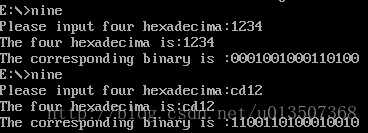汇编-从键盘输入数据并显示的程序
一、实习目的与要求
掌握接收键盘数据的方法并了解将键盘数据显示时须转换为ASCⅡ码的原理。
二、实习内容
编写程序将键盘接收到的四位十六进制数据转换为等值的二进制数,再显示在终端上。
三、代码
data segment
numStr db 4 dup(?),0ah,0dh,'$'
msgOne db 'Please input four hexadecima:','$'
msgTwo db 'The corresponding binary is :','$'
msgThree db 0ah,0dh,'Input Error,Please this number again:','$'
msgFour db 0ah,0dh,'The four hexadecima is:','$'
c16 dw 16;
result dw 0;
data ends
myStack segment stack
db 100 dup(?)
mystack ends
code segment
assume DS:data,CS:code
start:
mov ax,data;
mov DS,ax;
lea dx,msgOne; 输出msgOne
mov ah,09h;
int 21h;
mov cx,4;
mov bx,0;
inputNum:
mov ah,01h; 从键盘输入一个字符,其ASCII存放在al中
int 21h;
call change; 若字符al为小写字母,则转换为相应的大写字母
cmp al,'0'; 若al < '0'
jb inputError;
cmp al,'f'; 若al > 'f'
ja inputError;
cmp al,'9'
jbe inputRight
furtherJudge:
cmp al,'a'
jae inputRight;
jmp inputError;
inputRight:; 输入正确是的处理
mov numStr[bx],al;
inc bx;
jmp continue;
inputError:; 输入错误时的处理
lea dx,msgThree;
mov ah,09h;
int 21h;
inc cx;
continue:
loop inputNum
lea dx,msgFour; 输出msgFour
mov ah,09h;
int 21h;
lea dx,numStr; 输出numStr
mov ah,09h;
int 21h;
mov cx,4;
mov bx,0;
mov ax,0;
mov result,0;
tranToBinary:
call changeTwo;
shl result,1;
shl result,1;
shl result,1;
shl result,1;
mov al,numStr[bx];
add result,ax;
inc bx;
loop tranToBinary
outTranToBinary:
lea dx,msgTwo;
mov ah,09h;
int 21h;
mov cx,16;
printResult:
shl result,1;
jae printZero;
mov dl,'1'
jmp nextPrint;
printZero:
mov dl,'0'
nextPrint:
mov ah,02h;
int 21h;
loop printResult
mov ah,4ch; 程序结束
int 21h;
change proc; 将小写字符转换为大写字符,若不是小写字母,则不做处理
;al中为要转换的小写字母,al返回相应的大写字母
cmp al,'A';
jb then;
cmp al,'Z';
ja then;
add al,20h;
then:
ret;
changeTwo proc; 将十六进制字符转换为十六进制
;numStr[bx]中保存要转换的十六进制字符
cmp numStr[bx],'0';
jb next
cmp numStr[bx],'9'
ja further
and numStr[bx],0fh;
jmp next;
further:
cmp numStr[bx],'a'
jb next;
cmp numStr[bx],'f'
ja next;
sub numStr[bx],87;
next:
ret
code ends
end start四、运行结果
